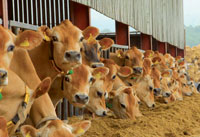Can we count on an end soon to the 10-year census?

For farmers who get het-up by red tape, this year has not been a good one so far.
Having got through the trial of filling in single farm payment applications, renewing Entry Level Scheme agreements and completing the myriad other farming-related forms, an extra document arrived on their pile of paper work – the June Census.
Under European Union law, a full census on farm structures has to be carried out every 10 years.
It collects data on agricultural labour, land areas, livestock numbers and farm diversifications from about 120,000 producers across England.
Smaller surveys are also required on farm practices, covering things such as slurry storage and livestock housing, as well as irrigation, looking at water volumes used to irrigate crops. These surveys are sent out to between 40,000 and 70,000 farmers each year, depending on EU requirements.
It is a detailed list, and one many farmers view as intrusive and unnecessary – particularly as much of the information is already required for completion of SFP application forms.
Some farmers are so frustrated by having to duplicate the form-filling job that they ignore the surveys or make a half-hearted effort at filling them in.
But DEFRA claims the data the census collects are vital – allowing it to create a detailed assessment of agriculture in the country, monitor the effects of CAP reform and create the basis for policy changes.
So who is right? A selection of people from across the industry have given their views on how useful the Census is and whether farming could survive without it.
Carl Atkin
Head of agri-business research, Bidwells
 It’s a necessary evil. We constantly bemoan in the industry that we don’t have good data on lots of parts of the sector. I need to get my hands on good data so I can find out what the trends and issue are and without accurate census data it’s difficult to pinpoint what’s going on with different crops.
It’s a necessary evil. We constantly bemoan in the industry that we don’t have good data on lots of parts of the sector. I need to get my hands on good data so I can find out what the trends and issue are and without accurate census data it’s difficult to pinpoint what’s going on with different crops.
The business data on crop areas and what’s going on are pretty valuable – if we are going to make a case for legislation change or government support, having robust data to back up what’s going on is paramount.
I’m sure the process could be slicked up though. One of the big things this year is that it’s expanded quite a lot to include things about labour on the farm. For a lot of farm businesses who have contract agreements, these questions can be difficult to anwswer.
I know it’s a bore and everyone hates it and people are slapdash at filling it in. People don’t take the same care as they would with their SFP form. But it’s important to make sure it’s as accurate as possible – for all its problems, it’s a definitive reference point.”
Andrew Bays
Partner at BCM rural property consultants
 The census is now a totally unnecessary piece of data collation given the amount of information held by DEFRA and the RPA through the single payment and other land-based schemes and records.
The census is now a totally unnecessary piece of data collation given the amount of information held by DEFRA and the RPA through the single payment and other land-based schemes and records.
I am sure this information was vital in 1866 when the census was initially conceived – but not now.
The situation is made worse by the lack of clarity in the rural world as to what the census information is used for and what purpose it serves.
I am sure the data are invaluable to UK National Statistics in providing certain records but it is far from clear how this provides real benefits at farmer level. This lack of buying into the process probably means that the level of detail and accuracy provided is not that great anyhow.”
William Worsley
President, Country Land and Business Association
 Statistical information is essential to the CLA in assembling information and evidence to help us protect our members’ interests.
Statistical information is essential to the CLA in assembling information and evidence to help us protect our members’ interests.
There is a strong element of public good in statistical information so we believe it should continue to be collected by DEFRA.
However, as with all regulations, the annual June Census is a bind and the system could be improved to make it easier for farmers to complete. More and more government services are moving online which does make data reporting easier, but only works where effective broadband is available.
DEFRA must continue to offer businesses which can’t get broadband of sufficient speed easy-to-complete hard copies of forms until the universal service commitment of two megabits a second is implemented.”
Tom Hind
Chief economist NFU
 The census is an area we find very useful as it provides detailed information on a fairly robust level. We wouldn’t have been able to put together the Campaign for the Farmed Environment without it. Having access to data that are independent is very important.
The census is an area we find very useful as it provides detailed information on a fairly robust level. We wouldn’t have been able to put together the Campaign for the Farmed Environment without it. Having access to data that are independent is very important.
A lot of farmers find it bureaucratic but as a lobbying organisation we need this information as an indicator of how the industry’s doing. The information is also useful on a defensive level when people criticise the industry.
Whether there’s a way of finding out information about agri-environment schemes and land management, I don’t know, but I’m loathe to say we should get rid of it. To a lot of farmers the questions seem daft, but in the round having these results is invaluable for the industry.”
Find out how to put your suggestions forward for the Rip Up Red Tape campaign
• You can submit your suggestions of the red tape you would like to see ripped up here.
• You can also write to: Task Force on Farming Regulation Area, 8D Millbank, DEFRA, Nobel House, 17 Smith Square, London SW1P 3JR
• Alternatively you can post your suggestions on the Farmers Weekly forums or send us a letter
• You have until Sunday 31 October to get in touch
